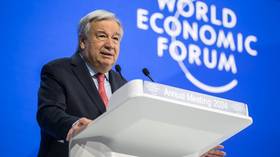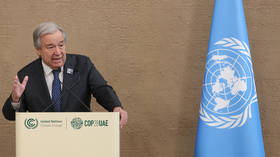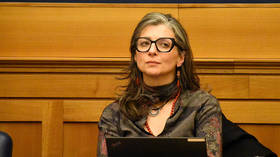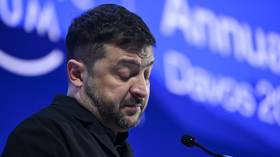Governments worldwide losing trust of people – UN

People no longer trust their governments to tackle climate change, war, and inequality, UN Secretary General Antonio Guterres has said. While Guterres views a reformed UN as the solution, polling shows that most Westerners want their leaders to simply focus on different issues.
Addressing the World Economic Forum’s annual meeting in Davos on Wednesday, Guterres opened by declaring climate change and the development of artificial intelligence to be the most serious threats to public trust in government worldwide.
“In the face of the serious, even existential threats posed by runaway climate chaos, and the runaway development of Artificial Intelligence without guard rails, we seem powerless to act,” he said.
“These two issues – climate and AI – are exhaustively discussed by governments, by the media, by leaders here in Davos, and yet we have no effective global strategy to deal with either,” he continued. “Geopolitical divides are preventing us from coming together around global solutions. Little wonder that people everywhere are losing faith in governments, institutions, and financial and economic systems.”
Turning to the conflicts in the MIddle East and Ukraine, Guterres blamed both on the breakdown of the US-led unipolar world order. “I am confident we can build a new, multipolar global order,” he said, pointing out that doing so will require reform at institutions like the UN Security Council and World Bank to give greater say to non-Western countries and those in the Global South.
Guterres did not elaborate on any specific reforms, but claimed that the UN’s New Agenda for Peace offers a viable path to preventing future conflicts. Although nominally aimed at balancing geopolitical relations between the world’s military powers, this plan also proposes the phaseout of fossil fuels, the monitoring of online “hate speech” worldwide, and the elimination of “patriarchal power structures.”
Public trust in government has fallen across the Western world since the turn of the millennium. A Pew Research survey found that only 16% of Americans currently trust their leaders and institutions, down from 44% in the year 2000. A survey taken by the EU in 2022 found that the average citizen of the bloc gave their government a ‘trust score’ of 3.6 out of 10, down from 4.7 in 2020.
However, there is a disconnect between the issues highlighted by Guterres and the issues that the public in the US and EU actually consider important. While the UN chief made climate change and AI the focus of his speech, Americans by and large do not consider these to be pressing concerns. According to a Gallup poll conducted last year, Americans rated the economy, poor leadership, inflation, and immigration as their top concerns, with only 3% of respondents naming climate change as their most important issue, and less than 0.5% identifying AI or foreign conflicts as their top priority.
EU citizens overwhelmingly rate immigration as their chief concern, followed by the conflict in Ukraine, with climate change their fifth priority, according to a Eurobarometer survey taken in December.













